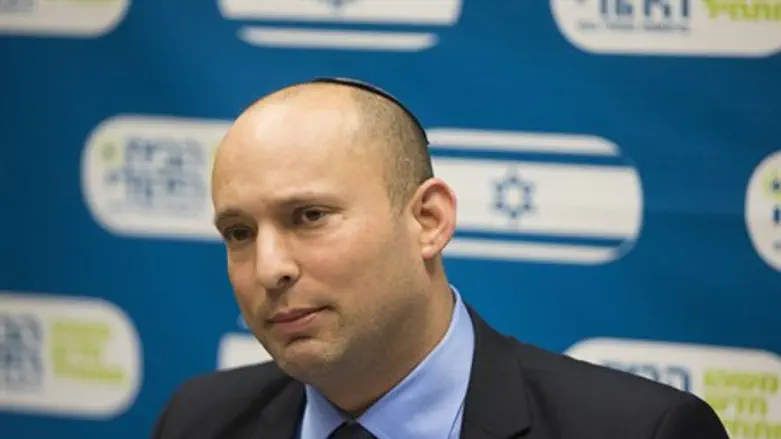
Economy Minister Naftali Bennett expounded his political vision and discussed upcoming elections Saturday night at the Saban Forum in Washington during an interview with Martin Indyk, US President Barack's Obama's envoy to Israel-Palestinian Authority peace talks.
In a heated portion of the dialogue, Bennett asked Indyk: "How many people need to die before you wake up?"
"I believe that the last summer moved anywhere from 10% of Israelis from the left to center, and from center to the right," Bennett stated, referring to public feelings in the wake of Operation Protective Edge.
"It wasn't a two day thing, but a fifty day thing. People felt to some degree helpless...these missiles and rockets were fired from the very place we did things right."
Bennett then began discussing his "imperfect, but active" solution to the Israeli-Palestinian conflict, which includes the annexation of area C of Judea and Samaria into Israel. All Palestinian Arabs living in that area will then be offered citizenship or permanent residency.
Referring to the division of Jerusalem, Bennett stated, "The last thing the Arabs of Jerusalem want is to live under the corrupt and dysfunctional rule of the Palestinian Authority."
Opinions are divided on Judea and Samaria, he added. "The reality is that the solution we have discussed in the last three decades is not working. Why don't we take the money being invested in the industry of peace and conferences, and invest it in making the lives of Jews and Arabs better?"
"No one is going anywhere - neither are we, nor are they. We should be working to improve what there is." He added, "maybe this is not the perfect solution but we should not chase after perfection that will lead us to disaster."
'Undo the years of nonsense'
"There's a process of changing the global view of what's going on here," Bennett told Indyk, who asked if he could deal with the consequences of his solution to the conflict, which might include an international boycott of Israel.
"We have to undo the years of nonsense that the peace industry has fermented, which led us to the position where the world thinks we are occupiers in our own land."
"Israel has to identify what it's true values are," Bennett stressed.
Earlier in the conversation, Bennett discussed his relationship with Israeli Prime Minister Binyamin Netanyahu and their "arrangement" not to attack each other during the campaign for the 2015 elections.
However, Bennett did note that he "was critical and I still am critical of [Netanyahu’s] policies. He supports a Palestinian state and I oppose it. I thought that in many cases he made mistakes [during Operation Protective Edge] and I told him, and sometimes publicly, when I thought it might influence.”
Yet, when asked if he thought he would become prime minister, Bennett demurred, instead saying he has a lot to learn and that he's "not obsessed with becoming prime minister."
Bennett, who was inspired to join politics after the Second Lebanon War in 2006, stated that "the mission of my party is to restore the Jewish soul to Israel."
Despite this being one of the most chaotic elections he can remember, Bennett emphasized that he continues to envision Israel as "a lighthouse standing in a Muslim storm."